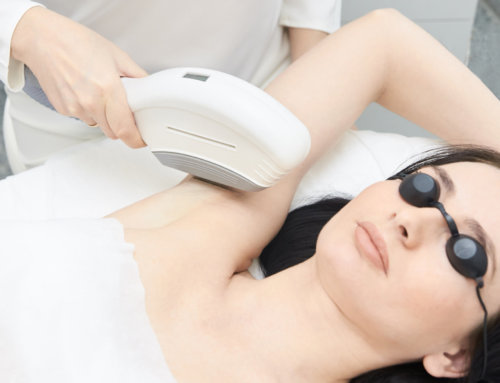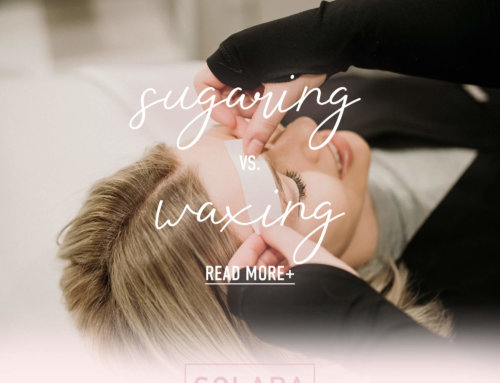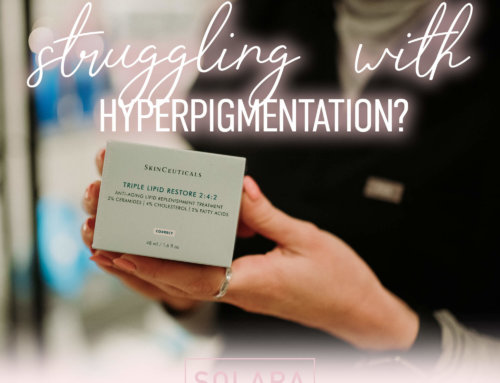A simple walk down the beauty product aisle at the store can be a confusing experience these days. There are hundreds of skin care products with a wide array of chemicals, natural ingredients and other elements that can be challenging to pronounce. There are creams for young skin, acne prone skin, aging skin, dry skin, men’s skin and combination skin. It can certainly be challenging to determine which products are best for your specific needs. Television and magazine advertising promote various “acids” contained in skin care products which are designed to achieve different results depending on your skin care regimen and skin care needs. At Solara we offer various facials, some of which contain various types of acids. Below we have included some helpful information about the different kinds of skin care product acids often seen in products today. Hopefully this will help you better understand what these products do and how they may or may not help you.
What are some common skin care acids?
On its own the word acid can foster some pretty scary images. Most people think of bubbling test tubes or a liquid capable of causing burns or disintegrating things. Acids are indeed capable of such things, however when used in the proper amounts and concentrations they are also some of the most beneficial ingredients available for skin care products. Acids can be used to fight acne, wrinkles, age spots, dark spots and uneven skin tone-to name a few. But with so many-which do you choose?
Salicylic acid
This is probably the most well-known of the skin care acids. Salicylic acid has been around on the market for a long time and is well known for is reputation as an exfoliator. It also does a great job of clearing pores which can help to reduce the intensity and frequency of acne breakouts. In low concentrations (.5 and 2 percent) salicylic acid can be found in cleansers and serums as well as spot treatments for treatment of acne breakouts. In higher concentrations, salicylic acid can be used as a peeling agent to treat acne scars, acne, sun damage, age spots and melasma. These procedures are generally done in a clinical setting as the process can be harmful to your skin if done incorrectly. Salicylic acid is related to aspirin (acetylsalicylic acid) and therefore it has natural anti-inflammatory properties.
Glycolic acid
This is the most popular alpha-hydroxy acid (AHA) used in skin care products. Glycolic acid is derived from sugar cane and has the smallest molecule size of any of the other AHA products. This makes it the most effective at entering the pores and being able to successfully do its job. Glycolic acid has developed a reputation for being an excellent “jack of all trades” anti aging agent. Glycolic acid is effective at exfoliation as well as in the reduction of fine lines, acne prevention and evening out skin tone and texture. Glycolic acid is also used at higher concentrations in skin peels in a professional setting. This is sometimes done in conjunction with microneedling or microdermabrasion.
Mandelic acid
This is another alpha-hydroxy acid; this one is derived from bitter almonds. Mandelic acid shares many of the same uses as glycolic acid including preventing acne and evening out skin pigmentation. However, mandelic acid has a larger molecule size it does not penetrate in the same way as glycolic acid and can be less irritating to the skin than glycolic acid. For this reason, mandelic acid is more commonly used in chemical peels.
Ascorbic acid
This is the most common water-soluble form of vitamin C. Ascorbic acid is used in skin care products for its anti-aging effects. It has also been used in the treatment of melasma for those who are unable to tolerate some of the more traditional treatment approaches. Vitamin C is a vital molecule for skin health as it plays an important role in collagen synthesis. Some studies have also shown that vitamin C may help to prevent and treat skin damage associated with exposure to ultra violet light however there is limited research associated with this. Vitamin C can be applied topically in the form of absorbic acid or consumed through diet/ Eitjher way the effects on the skin can be beneficial.
Hyaluronic acid
This is another skin care acid that is commonly promoted on television. We have all seen the commercials with Jennifer Aniston promoting the skin health benefits associated with products containing this acid. Hyaluronic acid is a substance that is found naturally in human skin. It helps the skin to retain water which keeps the skin hydrated and plump. The hyaluronic acid molecule can hold up to one thousand times its weight in water which is pretty impressive for a little molecule. Just like collagen and elastin, the amount of hyaluronic acid naturally occurring in the body decreases as we age. Hyaluronic acid is commonly found in virtually every anti-aging skin care product on the market including serums, creams, masks and peels. It is important to keep in mind that hyaluronic acid does not work well with acids that have a low pH such as glycolic acid as they tend to cancel each other out.
Which skin care acid should I use?
The first thing to determine when trying to establish the proper skin care products for you is to determine what you are trying to achieve with your skin care. Are you looking to reduce acne? Are you trying to reduce to appearance of fine lines and wrinkles? Do you have age spots or pigmentation issues? Is your skin texture rough, dry or peeling? Once you determine your primary concern you can determine which products may be best for you.
If you have acne prone skin, you will want to consider products that contain salicylic acid or glycolic acid. If you have mature or aging skin products that contain glycolic or ascorbic acid may be beneficial. If you have pigmentation concerns, you may want to consider looking for products that contain glycolic acid.
It is always suggested that you contact a skin care professional before applying products to your skin that you are unfamiliar with. Despite the over the counter nature of skin care creams, some do have unintended side effects if they are used improperly. There are also some skin care acids which interact with prescription medications or increase your sensitivity to sun and light exposure. There are also certain products that are not recommended for women who are pregnant or breast feeding. These are all important things your skin care professional can discuss with you while providing guidance.
Choosing the proper skin care products for your needs can be challenging and confusing. The easiest way to go about it is to contact a skin care professional who can work with you to determine which products would work best for your skin.
Consider choosing one of our soothing facials or other skin care treatments we offer at Solara Laser Center. In addition to our express facial and hydration facial, we offer custom facials that can pinpoint your skin care needs. We also offer peels and acne treatments using some of the more common skin care acids. Contact us today to schedule an appointment. We would be happy to discuss your skin care needs with you and help you understand the best skin care products for your needs.











